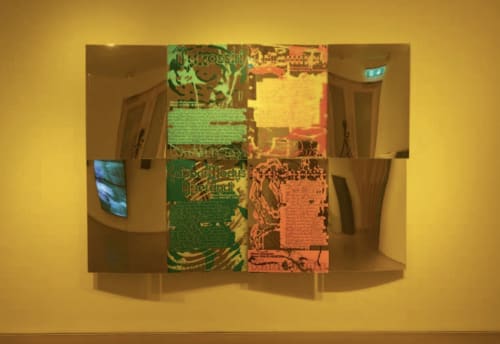It is the beginning of June in London and in temperatures over 30°, for the first time again, British government guards faint under their bearskin hats in the sun during Kent Chan's exhibition at Gasworks speculated about the future of a world in which the tropics have long since developed into the goal and background of a new form of civilization.
His vision is about the transition from the old tropes, which served as a foil to Western modernity and its colonialism, to a new exhibition view by Kent Chan. Great Britain Future remains polemically open in Chan's film as well as in the exhibition structure as a whole. In the works jumps in time and the confusing reincarnations in which the characters exchange their former and later selves, Chan refuses to unravel who is suggesting and trying to explain what to whom and from where. In his new film, Future Tropics, which can and must also be seen under the conditions of climatic interventions, the protagonists report from a world in which climate collapse is spreading a new kind of tropics across the entire planet has. After escaping the overheated ancient tropics, which had long been no longer habitable, some fled to the planet Venus, while others settled on a newly redistributed Earth. Form of tropicality that expanded across the entire planet after climate collapse. Chan works with this motif in various ways. For a long time now he has repeatedly overheated the gallery rooms he uses to create a tropically humid climate model. Using humidifiers and heating systems, he reverses the museum's convention of climate-controlled conditions into its opposite. With the help of sensors and automated processes, these climate interventions are subjected to a chaotic rhythm that corresponds more to the catastrophic time frame of climate collapse than to the previously reliable change of seasons.
As part of and under the conditions of these Warm Fronts (2021–...) works that have been ongoing for years, he is presenting a four-channel video for the exhibition at Gasworks in which musicians from Brazil, Kenya, India and Indonesia present their musical sets. The work was realized during the Covid-19 pandemic and is based on the fundamental questioning of conventional patterns of space and time under the globalized conditions of local isolation. Chan supports the music overlays with a poster that announces the musicians, but is dated to the distant future.
Between the modified climatic conditions of the gallery and the disorienting references in the film and posters, the future Chan enacts is both close and always intangible. From the narrative world of the film, the question of the future of the planet appears primarily as a deep uncertainty regarding its past, which has long been unrecognizable. Since when, asks one of the protagonists, have palm trees replaced traditional bamboo in Chinese ink drawings. Another asks herself and the audience what visa restrictions forced her mother to flee to Venus. Yet another of the characters presents herself as a curator of moderate climate zones, which can only be attributed to her light skin color. When it got too hot, the museums became refugees outside climates that were no longer sustainable, she says, indirectly referring to the climate-controlled art space conditions that Chan torpedoed with the exhibition as a whole. In Chan's tropical future after the end of the climate, the memory of species and climate diversity can only be experienced in the moderate museum climate.
Whether this vision of a distant but still human future should be described as hell or as a twin of the world, or simply as that.


